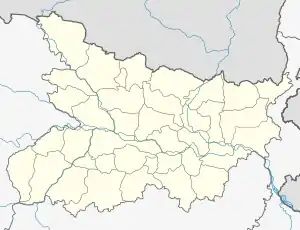Jamui
Jamui is a town and a municipality in Jamui district in the Indian state of Bihar. It is the district headquarter of Jamui district. Jamui was formed as a district on 21 February 1991 as a result of its separation from Munger.
Jamui | |
|---|---|
Town | |
 Jamui Location in Bihar, India | |
| Coordinates: 24.92°N 86.22°E | |
| Country | |
| State | Bihar |
| Region | Angika |
| Division | Munger |
| District | Jamui |
| Ward | 30 wards |
| Named for | Jambhiya Gram |
| Government | |
| • Type | Chairman–Nagar Parishad |
| • Body | Jamui Nagar Parishad |
| Elevation | 78 m (256 ft) |
| Population (2011) | |
| • Total | 87,357 |
| Languages | |
| • Official | Maithili,Urdu, Hindi |
| Time zone | UTC+5:30 (IST) |
| PIN | 811307
811307 |
| Telephone code | 06345 |
| ISO 3166 code | IN-BR |
| Vehicle registration | BR-46 |
| Sex ratio | 912/1000(2011) ♂/♀ |
| Website | www |
Historical existence of Jamui has been observed from the period of Mahabharta war. Archaeological and historical evidence shows its close association with the Jain tradition for a long past to the present time. A large part of this area is covered by forest.
There are mainly two hypotheses which have been mentioned by historians regarding the origin of the name of the district Jamui. The first hypothesis said that the name of Jamui derived from "Jambhiya Gram" or "Jribhikgram" village, which has the place of attaining ‘Omniscience’ (Kevala Jnana) of Vardhaman Mahavira and according to another hypothesis the name Jamui is originated from Jambuwani.
Geography
Jamui is located at 24.92°N 86.22°E.[1] It has an average elevation of 78 metres (255 feet).
Jamui is well connected to the rest of the country via road while the Delhi-Howrah rail line is 3 kilometres (1.9 mi) away at Mallepur (Malaypur railway station is also known as Jamui railway station). Lok Nayak Jayaprakash Airport in Patna is about 161 kilometres (100 mi) and Gaya Airport 136 kilometres (85 mi) away.
Situated along the Bihar-Jharkhand border, Jamui is dotted with hills and the small retreat town of Simultala falls within the Jhajha block, on the main Delhi-Howrah rail line. The town of Gidhaur, situated 17 kilometres (11 mi) away was the seat of kings during the British Raj and many buildings from the period still survive. Minto Tower in Gidhaur is a prime example of architecture from the period. Jamui district is also known for having many places related to the origin of Jainism.
The district has untapped reserves of resources including mica, coal, gold and iron ore.
Demographics
As of 2011 India census,[2] Jamui had a population of 87,357. Males constitute 52.6% of the population and females 47.26%. Jamui has an average literacy rate of 64.33%, lower than the national average of 74.04%: male literacy is 57.39%, and female literacy is 42.6%. In Jamui, 16.22% of the population is under 6 years of age.
.
Economy
In 2006 the Ministry of Panchayati Raj named Jamui one of the country's 250 most backward districts (out of a total of 640).[3] It is one of the 36 districts in Bihar currently receiving funds from the Backward Regions Grant Fund Programme (BRGF).[3]
Divisions
- No. of Police District 1
- No. of Sub-Divisions 1
- No. of Blocks 10
- No. of Circles 10
- No. of Police Stations 28
- No. of Panchayats 153
- No. of Villages 1,506
Famous People
- Chandrashekhar Singh: a member of Indian National Congress and served as the Chief Minister of Bihar from Aug 1983 to Mar 1985. He also held a number of Cabinet Ministers positions.
- Digvijay Singh: an Indian politician from the state of Bihar and an independent Member of the Parliament of India representing Banka in the Lok Sabha.
- Onkarnath Baranwal: an Indian politician from the state of Bihar, Batiya.
References
- Falling Rain Genomics, Inc - Jamui
- http://www.censusindia.gov.in/pca/SearchDetails.aspx?Id=270985
- Ministry of Panchayati Raj (8 September 2009). "A Note on the Backward Regions Grant Fund Programme" (PDF). National Institute of Rural Development. Archived from the original (PDF) on 5 April 2012. Retrieved 27 September 2011.
